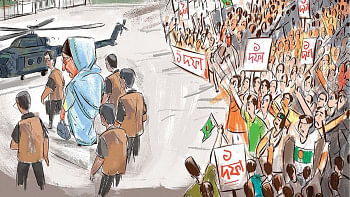Will buses ever be women-friendly?

We're alarmed by a new transport survey that says that 63 percent of the women and girls using public transport in Dhaka have had to face various forms of harassment including sexual harassment. While 47 percent of the surveyed complained of being sexually harassed, 61 percent said they were deliberately touched by bus staff while boarding or getting off buses. Some 25 percent of them said they experienced such touches at least three times in the last six months. Equally disturbingly, a significant percentage of those who had faced sexual or other forms of harassment in public transport later suffered from mental health issues.
These findings show that almost nothing has changed in terms of the safety of women and girls in public transport, although the issue has been in discussion for long. The gravity of the situation can be understood from the fact that a number of women were raped and killed inside the buses, too. Sadly, these incidents have not led to significant action on the part of the authorities. Prior to this survey, several other surveys in the past also revealed the toxic male-dominated environment in public transport where women could hardly raise their voices after being harassed or bullied. Although there has been a practice of keeping seats reserved for women, this is not nearly enough because either the seats are too few for the growing number of women and girls needing public buses, or, as is often the case, these are occupied by male commuters.
Moreover, reserving a few seats alone will not improve the situation as long as the patriarchal mindset of men remains unchanged. While awareness is needed among male passengers, especially male helpers, to change their mindsets, the existing laws against gender harassment/violence also need to be enforced regularly to hold the perpetrators accountable. Women also need to be given necessary support so that they can file complaints against their harassers. To ensure this, the drivers and helpers, and even police officers, need to be given proper training on gender issues.
Experts have suggested some specific interventions such as increasing the number of women-only buses, installing CCTV cameras and vehicle-tracking systems in all passenger vehicles, putting nameplates in every one of them mentioning the names of drivers and helpers, conducting mobile court drives to punish the harassers, etc. It's time the authorities heeded these suggestions which, we hope, will help ensure a safe environment for female commuters.

 For all latest news, follow The Daily Star's Google News channel.
For all latest news, follow The Daily Star's Google News channel. 








Comments